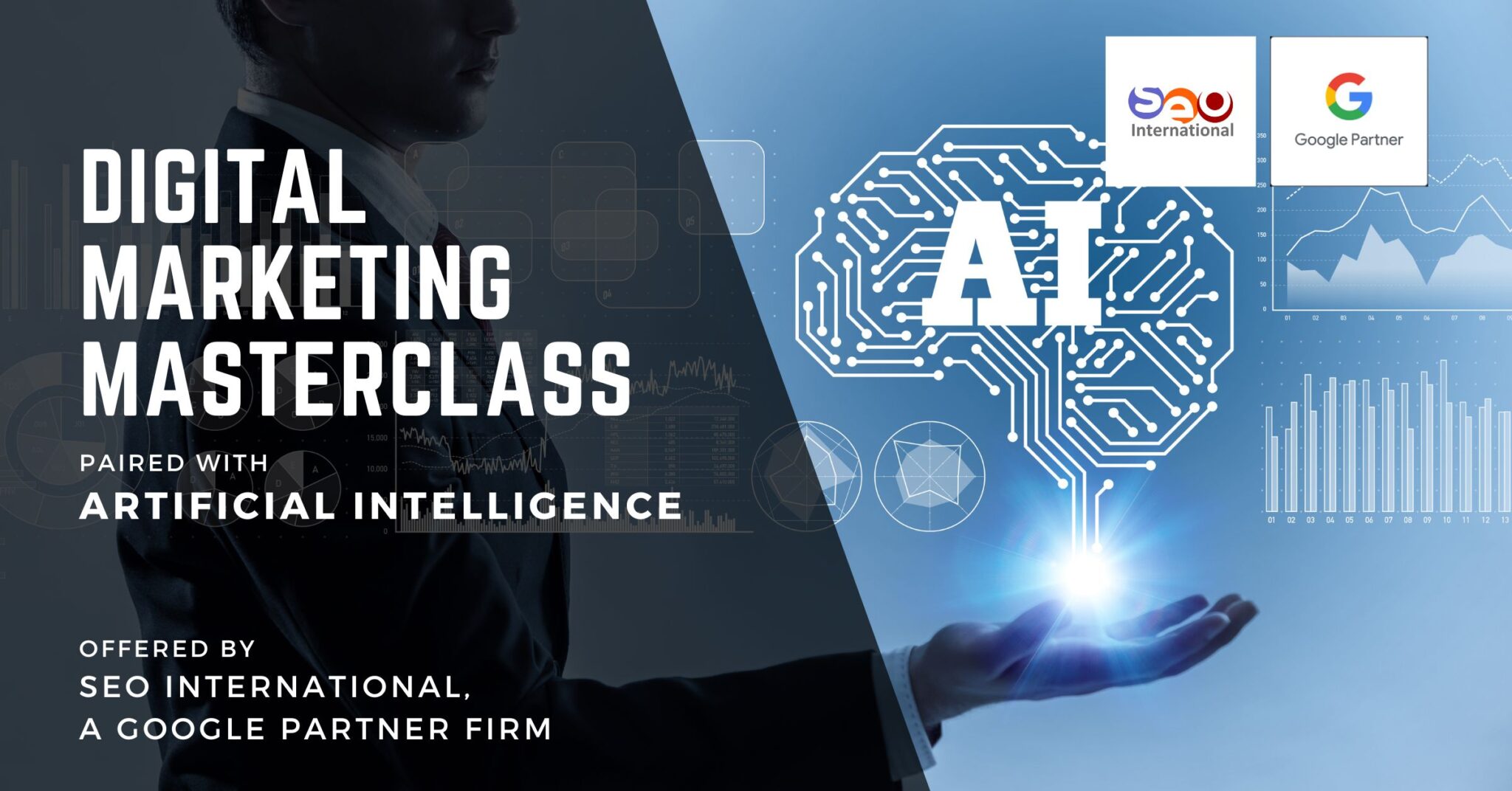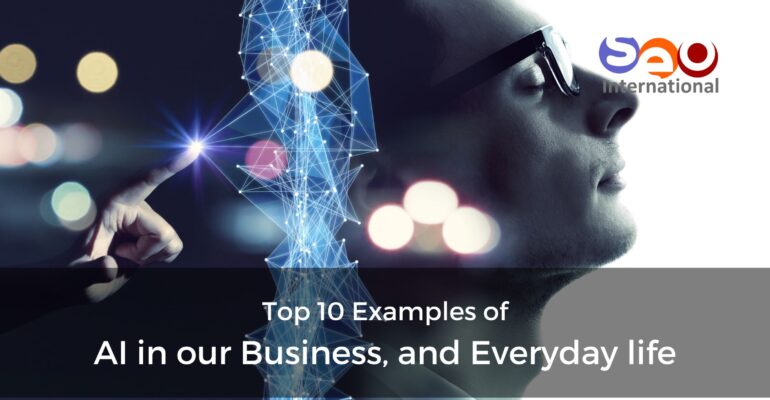AI in our Business and Everyday Life – Top 10 Examples
December 2, 2022 2022-12-02 3:43AI in our Business and Everyday Life – Top 10 Examples
Artificial intelligence has infiltrated our lives in many ways, some more obvious than others. As AI evolves and grows smarter, its impact on business and society will only continue to increase and businesses and individuals will keep finding ways to improve their productivity and efficiency. Its applications will become more and more common in business and daily life. From Amazon’s Echo to Google Photos’ facial recognition feature, AI is changing the way we live and work. Here are eleven examples of how AI is being used today.
The Growth of Artificial Intelligence
There is no doubt that artificial intelligence (AI) is rapidly evolving. AI has the power to change a wide range of industries by using data and algorithms. The potential for AI is becoming more advanced and it is being used in different ways such as diagnosing diseases and driving cars. In the future, AI will play an even more important role in our lives and will redefine what it means to be human. Gartner reports that 86% of CEOs say AI is a mainstream technology in their office as of 2022 and 91.5% of businesses invest in AI. Also, customer satisfaction is expected to grow by 25% by 2023 in organizations that use AI. Forbes states that 50% of enterprises plan to spend more on AI by 2023. Most companies use AI to automate processes, enhance customer service and personalization, increase output, and analyze data. Therefore, businesses are trying to obtain a competitive advantage.
Artificial intelligence is no longer just a futuristic concept; it is being used in businesses and everyday life all around the world. Here are 11 examples of AI in action.
Apple’s Face ID
When you pick up your iPhone X, the first thing you’ll notice is the new display. Not only is it brighter and sharper than previous models, but the bezels are much thinner. There’s no home button – instead, Apple has introduced Face ID.
Face ID is a new way to unlock your phone and authenticate apps using just your face. It’s made possible by the TrueDepth camera system, which uses a dot projector, infrared camera and flood illuminator to map your face in 3D.
The Face ID system is incredibly secure – even more so than Touch ID. That’s because it uses a neural network that has been trained to spot fake or manipulated faces. So even if someone tries to unlock your phone with a photo of you, they’ll be out of luck.
And because Face ID is powered by Apple’s A11 Bionic chip and the Neural Engine, it’s incredibly fast. It’s almost instantaneous – you just look at your phone and it unlocks.
All of this is made possible by Apple’s revolutionary AI which recognizes faces accurately in an instant.
There are lots of other ways that Apple is using AI in its products. Siri, for example, is getting smarter all the time thanks to machine learning. And the new Photos app can automatically create memories and albums based on the people, places and things you take photos of most often.
So, whether you’re using Face ID to unlock your phone or Siri to book a restaurant reservation, Apple is using AI to make your life easier. And that’s just the beginning – with more and more companies investing in AI, we can expect to see even more amazing examples of its power in the years to come.
Maps & Navigation
One of the most popular and useful applications of AI is in the area of maps and navigation. By incorporating machine learning, AI-powered maps can provide more accurate and up-to-date information than ever before.
For example, Google Maps uses machine learning to constantly update its traffic information. It does this by anonymously tracking the location of users who have the app open on their phones. By monitoring the speed at which these users are moving, Google can estimate traffic conditions in real time and provide accurate routes to avoid congestion.
AI is also being used to create more detailed and realistic 3D maps. These maps can be used for a variety of purposes, such as planning a construction project or designing a new city.
One company that is at the forefront of this technology is Mapbox. Mapbox uses AI to automatically generate 3D maps from satellite imagery. The maps are so realistic that they can be used for everything from video games to autonomous driving.
Mapbox isn’t the only company using AI to create 3D maps. Nokia’s HERE Maps also uses machine learning to generate 3D maps of cities all over the world.
AI is gradually changing the way we interact with maps and navigation. With more accurate and up-to-date information, AI-powered maps are making it easier than ever to get around.
Self-Driving and Parking Vehicles
AI is also revolutionizing the transportation industry. One of the most exciting applications of AI is in the area of self-driving cars.
Self-driving cars are equipped with a variety of sensors, including lidar, radar and cameras. These sensors allow the car to “see” its surroundings and navigate safely without the need for a human driver.
However, these sensors alone are not enough to make a car fully autonomous. The car also needs to be able to process this information and make decisions about where to go and what to do. This is where AI comes in.
The AI system in a self-driving car is responsible for mapping the environment, detecting obstacles and making decisions about the best way to navigate. This is an incredibly complex task that requires a deep understanding of the world around the car.
Fortunately, machine learning is up to the challenge. By training a neural network on millions of images and videos, the AI system in a self-driving car can learn to detect objects and make decisions just like a human driver.
Self-driving cars are still rare and it may still be a couple of years till we see them everywhere, but they have the potential to transform the transportation industry. With no need for a human driver, self-driving cars could be cheaper, more efficient and less polluting than traditional vehicles.
In addition to self-driving cars, AI is also being used to develop autonomous parking vehicles. These vehicles use sensors and AI to park themselves without the need for a human driver.
Autonomous parking vehicles are again; not made available to the masses, yet. But they have the potential to transform the way we park our cars. With no need to make precise calculations and take your time out to reverse or parallel park your car, autonomous parking vehicles could make parking much easier and more efficient.
These massive improvements to AI are changing the transportation industry in a big way. With self-driving cars and autonomous parking vehicles, AI is making it possible to have a fully automated transportation system.
Music/Media Recommendations (YouTube, NetFlix, Spotify, etc.)
YouTube, Netflix, and Spotify all use AI to recommend new content to their users.
YouTube uses a deep learning algorithm called DeepMind to recommend new videos to its users. YouTube’s recommendation system is incredibly effective, with 70% of all watch time coming from recommendations.
Netflix also uses AI to recommend new movies and TV shows to its users. Netflix’s recommendation system is so effective that it accounts for 80% of all content watched on the platform.
Spotify uses a variety of AI techniques to recommend new music to its users. Spotify’s Discover Weekly playlist, which recommends new music based on your listening history, has been a huge success, with over 40 million users.
AI recommends new content to users by analyzing their previous behavior.
YouTube, Netflix, and Spotify all keep track of what their users watch and listen to. They then use this data to recommend new content that they think the user will enjoy.
YouTube, Netflix, and Spotify’s recommendation systems are all powered by machine learning algorithms. These algorithms can learn from user data and make better recommendations over time.
With such accurate and personal recommendations, AI is changing the way we consume media. With AI-powered recommendations, we are no longer limited to the content that we know about. Instead, we can discover new content that we never would have found on our own.
Digital Assistants (Google Assistant, Siri, Alexa, etc.)
Digital assistants are becoming more and more common as AI technology improves. Digital assistants are software programs that use artificial intelligence to perform tasks or provide information to users.
Apple’s Siri, Amazon’s Alexa, and Google’s Assistant are all examples of digital assistants. These digital assistants can perform tasks like setting alarms, playing music and answering questions.
Digital assistants are powered by natural language processing, which is a type of AI that enables computers to understand human language. Natural language processing is used to interpret the user’s voice and intentions.
Digital assistants are becoming more and more common as they get better at understanding human language. In the future, digital assistants will become even more prevalent and be used for more complex tasks.
Over the coming years, AI will change the way we interact with technology. With digital assistants, we can now talk to our devices and get them to perform tasks for us. This is just the beginning of how AI will change the way we interact with technology in the future.
AI in Finance
Finance is an industry that has been slow to adopt new technologies. But as AI becomes more advanced, it is starting to change the way that financial institutions operate.
AI is being used in finance to automate tasks, such as customer service and fraud detection. AI can also be used to provide financial advice and recommendations.
Some of the largest banks in the world, such as JPMorgan Chase and Goldman Sachs, are already using AI to automate tasks and provide financial advice.
In the future, AI will become even more prevalent in finance. AI will be used to automate more complex tasks, such as investment analysis and risk management. AI will also play a bigger role in providing financial advice to individuals and businesses.
As AI becomes more advanced, it will change the way that the finance industry operates. AI will make financial institutions more efficient and provide better services to their customers.
Betterment is an AI-powered financial investing platform that provides personalized investment plans and automated portfolio management. With over $33 billion in assets under management, Betterment has helped over 730,000 customers grow their wealth through smarter investing. Using algorithms to automate tax loss harvesting, trading, and transactions, Betterment frees up users’ time so they can focus on their financial goals.
AI in Copywriting
Copywriting is the process of creating compelling marketing materials, such as website content, ad copy, and email newsletters.
In the past, copywriting was a manual process that required human writers to come up with creative ideas and write persuasive copy. However, with the advent of artificial intelligence (AI), copywriting is becoming more automated.
There are now AI-powered copywriting tools that can help businesses create better marketing materials. These tools use natural language processing and machine learning to understand the user’s needs and generate copy that is tailored to those needs.
One AI-powered copywriting tool is Jasper, which was developed by the startup Persado. Jasper uses natural language processing and machine learning to understand the user’s needs and generate copy that is tailored to those needs.
Jasper is used by some of the world’s largest companies, including Coca-Cola, Dell, and Microsoft. Jasper has helped these companies create better marketing materials, resulting in more sales and higher customer satisfaction.
As life goes on, AI-powered copywriting tools will become even more sophisticated and be used by more businesses. These tools will help businesses save time and money while creating better marketing materials.
Using AI to make Short Videos and Transcriptions
In the past, creating videos and transcribing audio recordings was a time-consuming and expensive process. However, with the advent of artificial intelligence (AI), these tasks can now be done quickly and cheaply.
There are now AI-powered tools that can create videos and transcribe audio recordings. These tools use natural language processing and machine learning to understand the user’s needs and create videos and transcripts that are tailored to those needs.
The Cloudinary video solution includes several powerful video transformation capabilities, such as cropping, overlays, optimizations, and a wide variety of special effects. With the Google AI Video Transcription add-on, you can automatically generate speech-to-text transcripts of any videos that you or your users upload into your production environment. This add-on makes use of Google’s Cloud Speech API to apply powerful neural network models to your videos to get the best possible speech recognition results. In addition, the add-on supports transcribing videos in nearly any language. Once the transcript file is generated, you can parse its contents to display the transcript of your video on your page.
Synthesia is a powerful AI-based video creation platform that enables users to create videos without having to show their faces on camera. This makes it an ideal solution for businesses and individuals who want to create professional-quality videos without the need for expensive equipment or studio space. With Synthesia, you can use avatars to create stunning videos that are suitable for a variety of purposes. The platform also offers access to a library of 65+ languages and accents, ensuring that you can create videos that reach a global audience.
With the advancement of such tools, AI-powered video creation and transcription tools will become even more sophisticated and be used by more businesses. These tools will help businesses save time and money while creating better videos and transcripts.
AI in the Retail Industry
Artificial intelligence is playing an increasingly important role in the retail industry, helping companies to personalize the customer experience, increase sales and build loyal relationships. AI-driven algorithms can help to recommend products, deploy chatbots and predict purchases. By gathering data and using machine learning, retailers can create a more customer-centric shopping experience.
LivePerson is a retail personalization platform that uses artificial intelligence to deliver personalized recommendations to shoppers. The platform takes into account the shopper’s past purchase history, product preferences and current location to make recommendations in real time. LivePerson has been used by major retailers such as Macy’s, Bloomingdale’s and Neiman Marcus.
In addition to retail recommendations, AI can also be used to deploy chatbots. These chatbots can be used to provide customer support, answer product questions and recommend products. The chatbots are used to understand the user’s needs and provide relevant information.
Predictive analytics is another area where AI is being used in the retail industry. By analyzing past purchase data, AI-powered predictive analytics tools can predict what a shopper is likely to buy in the future. This information can be used to personalize the shopping experience and increase sales.
In the future, AI will play an even more important role in the retail industry, helping companies to save time and money while providing a better customer experience. Thanks to AI, retailers will be able to offer more personalized service, increase sales and build loyalty. In addition, AI-powered chatbots and product recommendations will become more sophisticated and accurate.
AI in Social Media
As more and more people unlock their phones and begin scrolling through their social media accounts first thing in the morning, AI is working hard behind the scenes to personalize each person’s feed. There are a few different ways that AI can personalize each person’s social media feed. AI algorithms can identify which types of posts are most likely to resonate with each individual and prioritize those accordingly by looking at the individual’s history and what they have engaged with in the past. Based on this information, the AI algorithm can prioritize similar content in the future. Additionally, AI is responsible for suggesting new friends, identifying and filtering out fake news, and working to prevent cyberbullying. By constantly improving its understanding of human behavior, AI is making social media an increasingly personalized and enjoyable experience for everyone.
AI is transforming social media marketing, with the potential to revolutionize how brands advertise across platforms like TikTok, Snapchat, Facebook, Instagram, Twitter, and LinkedIn. AI can create posts, draft and target ads, automated monitoring, and power most of what you see on any given social network. The “AI in the social media” market is projected to grow from $633 million in 2018 to more than $2.1 billion by 2023, according to estimates from Markets and Markets. AI is real technology that social media marketers can use today to get incredible results.
These are just some of the ways AI compliments Social Media
- Increased Personalization: AI can help to personalize each person’s social media experience by identifying the content that is most likely to resonate with them and prioritizing it accordingly.
- Improved Social Media Marketing: AI can assist with creating posts, drafting and targeting ads, automating monitoring, and powering much of what is seen on social media platforms.
- Greater Efficiency: AI can help to make social media more efficient by automating tasks such as identifying and filtering out fake news, or working to prevent cyberbullying.
- Enhanced User Experience: By constantly improving its understanding of human behavior, AI can make social media a more personalized and enjoyable experience for everyone.
AI is infiltrating all aspects of our lives, from the way we do business to the way we interact with friends and family. It’s important to stay ahead of the curve and understand how AI can be used in your specific industry or field. If you’re looking for more information on AI and digital marketing, consider taking our upcoming 5-Day Digital Marketing [paired with AI] Masterclass. With this comprehensive training, you’ll be able to use AI to its fullest potential to drive traffic, leads, and sales for your business.




